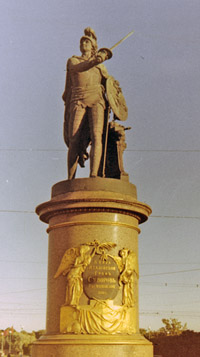It was after the campaign in Poland that Suvorov wrote his military manual, the Science of Victory (Наука побеждать), which circulated in manuscript form before finally being published in 1806. He was noted for the saying "Train hard, fight easy."
Tsar Paul I, upon assuming the throne, began to transform the Russian army on the basis of the Prussians, who Paul so adored. This Suvorov objected to. So in February 1797 Paul dismissed Suvorov and had him exiled and put under surveillance.
Suvorov's greatest moment came in the wars of the Second Coalition (Great Britain, Austria, Russia, Naples) against France beginning in 1798. At the request of Russia's allies, Paul had to recall Suvorov to active service and appoint him the commander-in-chief of the allied forces in Northern Italy. There Suvorov succeeded in defeating the French forces and removing France from the whole of Northern Italy. In the middle of August 1799, Paul and the Austrian Emperor ordered Suvorov to continue the war and join the allied troops in Switzerland. Suvorov, in one of the truly great feats of military history, was able to cross the Alps with his army, facing a series of brutal marches and skirmishes with the French. In Switzerland, Suvorov found his army in a desperate position, almost entirely surrounded by the French. After fighting his way out of the mess, the tsar ordered Suvorov to return to Russia. It was the end of Suvorov's campaigns.
Suvorov and Paul did not see eye-to-eye, and Suvorov remained essentially banished to his estate until his death on 15 May 1800. He was buried in the Annunciation Cathedral at the Aleksandr Nevskii Lavra in St. Petersburg with a plain tombstone inscribed, "Suvorov Lies Here."
Some other websites
- Wikipedia
- Alexander Suvorov
- Alexander V. Suvorov, Russian Field Marshal
- Alexander Vasilevich Suvorov
- Bruce Menning, "Train Hard, Fight Easy": The Legacy of A. V. Suvorov and His "Art of Victory," Air University Review (November-December 1986)
